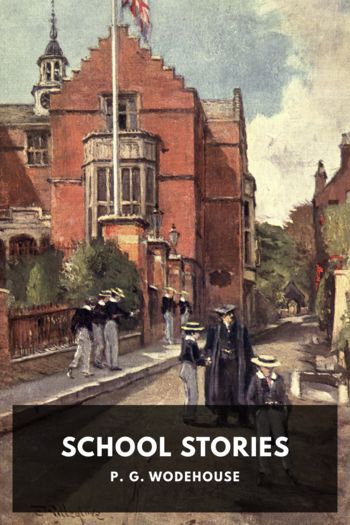School Stories - P. G. Wodehouse (best e book reader TXT) 📗

- Author: P. G. Wodehouse
Book online «School Stories - P. G. Wodehouse (best e book reader TXT) 📗». Author P. G. Wodehouse
“It’s a cinch,” murmured Mr. Ring with a glad smile, as he boarded his train, “a lead-pipe cinch.”
Everybody who has moved about the world at all knows Ring’s Come-one Come-all Up-to-date Stores. The main office is in New York. Broadway, to be exact, on the left as you go down, just before you get to Park Row, where the newspapers come from. There is another office in Chicago. Others in St. Louis, St. Paul, and across the seas in London, Paris, Berlin, and, in short, everywhere. The peculiar advantage about Ring’s Stores is that you can get anything you happen to want there, from a motor to a macaroon, and rather cheaper than you could get it anywhere else. England had up to the present been ill-supplied with these handy paradises, the one in Piccadilly being the only extant specimen. But now Mr. Ring in person had crossed the Atlantic on a tour of inspection, and things were shortly to be so brisk that you would be able to hear them whizz.
So an army of workmen invaded Wrykyn. A trio of decrepit houses in the High Street were pulled down with a run, and from the ruins there began to rise like a Phoenix the striking building which was to be the Wrykyn Branch of Ring’s Come-one Come-all Up-to-date Stores.
The sensation among the tradesmen caused by the invasion was, as may be imagined, immense and painful. The thing was a public disaster. It resembled the advent of a fox in a fowl-run. For years the tradesmen of Wrykyn had jogged along in their comfortable way, each making his little profits, with no thought of competition or modern hustle. And now the enemy was at their doors. Many were the gloomy looks cast at the gaudy building as it grew like a mushroom. It was finished with incredible speed, and then advertisements began to flood the local papers. A special sheaf of bills was despatched to the school.
Dunstable got hold of one, and read it with interest. Then he went in search of his friend Linton to find out what he thought of it.
Linton was at work in the laboratory. He was an enthusiastic, but unskilful, chemist. The only thing he could do with any real certainty was to make oxygen. But he had ambitions beyond that feat, and was continually experimenting in a reckless way which made the chemistry master look wan and uneasy. He was bending over a complicated mixture of tubes, acids, and Bunsen burners when Dunstable found him. It was after school, so that the laboratory was empty, but for them.
“Don’t mind me,” said Dunstable, taking a seat on the table.
“Look out, man, don’t jog. Sit tight, and I’ll broaden your mind for you. I take this bit of litmus paper, and dip it into this bilge, and if I’ve done it right, it’ll turn blue.”
“Then I bet it doesn’t,” said Dunstable.
The paper turned red.
“Hades,” said Linton calmly. “Well, I’m not going to sweat at it any more. Let’s go down to Cook’s.”
Cook’s is the one school institution which nobody forgets who has been to Wrykyn. It is a little confectioner’s shop in the High Street. Its exterior is somewhat forbidding, and the uninitiated would probably shudder and pass on, wondering how on earth such a place could find a public daring enough to support it by eating its wares. But the school went there in flocks. Tea at Cook’s was the alternative to a study tea. There was a large room at the back of the shop, and here oceans of hot tea and tons of toast were consumed. The staff of Cook’s consisted of Mr. Cook, late sergeant in a line regiment, six foot three, disposition amiable, left leg cut off above the knee by a spirited Fuzzy in the last Sudan war; Mrs. Cook, wife of the above, disposition similar, and possessing the useful gift of being able to listen to five people at one and the same time; and an invisible menial, or menials, who made toast in some nether region at a perfectly dizzy rate of speed. Such was Cook’s.
“Talking of Cook’s,” said Dunstable, producing his pamphlet, “have you seen this? It’ll be a bit of a knockout for them, I should think.”
Linton took the paper, and began to read. Dunstable roamed curiously about the laboratory, examining things.
“What are these little crystal sort of bits of stuff?” he asked, coming to a standstill before a large jar and opening it. “They look good to eat. Shall I try one?”
“Don’t you be an idiot,” said the expert, looking up. “What have you got hold of? Great Scott, no, don’t eat that stuff.”
“Why not? Is it poison?”
“No. But it would make you sick as a cat. It’s Sal Ammoniac.”
“Sal how much?”
“Ammoniac. You’d be awfully bad.”
“All right, then, I won’t. Well, what do you think of that thing? It’ll be rough on Cook’s, won’t it? You see they advertise a special ‘public-school’ tea, as they call it. It sounds jolly good. I don’t know what buckwheat cakes are, but they ought to be decent. I suppose now everybody’ll chuck Cook’s and go there. It’s a beastly shame,





Comments (0)